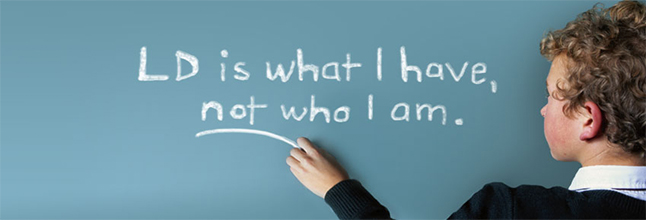In the year 2013, the Pakistan Association for Difficulties in Learning (PADIL) revealed that over 1.8 million children in Pakistan were affected by learning disabilities. These disabilities range from Attention Deficit Disorder (ADD), Attention Deficit Hyperactive Disorder (ADHD) and Dyslexia to Autism and many other issues. However, in the classroom, many learning disabilities get ignored not only by teachers but by parents too, who simply refuse to admit that their child may have a learning disability. The result is a lifetime of struggle for anyone with such a disability.
The world has progressed so much that it is now possible for children with learning disabilities to get an education just like a child with no learning disabilities. Special strategies and teaching techniques can be used to help a struggling child to overcome his or her problems. However, if left ignored, these disabilities can cause the child's self confidence and motivation to learn to shatter. Very often, we hear about how a child simply does not want to study. Without trying to understand the cause of such behaviour, we simply label the child as a careless, unattentive child.
It is natural for parents to want their children to excel academically. However, this desire has become somewhat of an obsession amongst Pakistani parents. Anything below an A grade is unacceptable to most of the parents. Children often get dragged into the debate of how expensive their education is as a result of which they absolutely must score an A grade. It has become a trade, a barter where the parents demand an A grade in return for the expenditure they endure for their child's education. Such pressure can destroy a child regardless of whether he or she has a learning disability or not.
Very often, children's behavioural patterns change. Some become extremely quiet and prefer isolation while others become violent, loud and rude. Both scenarios are equally disturbing. A child who prefers isolation will slowly allow this to become embedded in his or her nature. When this child grows up into an adult, he or she will be scared and insecure. Such an adult will also refrain from sharing his or her views for fear of rejection. The result? An individual who spends his or her entire life blended into the background. A child who decides to become loud and violent, on the other hand, will try and hide his or her difficulties behind a facade. He will try to hide his weaknesses through a well crafted image of strength. Such a child will always be in fear of that facade falling as a result of which, by the time this child grows up, he will have made this feature a permanent part of his personality.
It has, perhaps, become a social embarrassment for parents to admit that their child is not a high academic achiever. Why that is the case, I will never understand. Anybody can take pride in having a child who easily manages to get good grades in everything. True pride rests in a situation where a child who struggles every single day continues working hard instead of giving up.
It is pertinent to mention that if parents actually accept a child's learning disability, they can help their child perform better in many different ways. The Cambridge International Examinations body, for example, has 'access arrangements' for students with any special needs. A number of arrangements ranging from extra time to visual aids can be made for a child with any special needs provided the child's parents can provide the required documentation to prove the special need. A child with dyslexia, for example, can request for extra time ahead of the paper. Extra time can allow the child to read the exam slowly and carefully- something he or she would not be able to do otherwise owing to the lack of time.
A learning disability does not mean a child will never be able to get an education. It simply means that more effort will be needed to ensure that the child gets the education he or she deserves. It is time Pakistani parents and teachers started putting in that extra effort.






